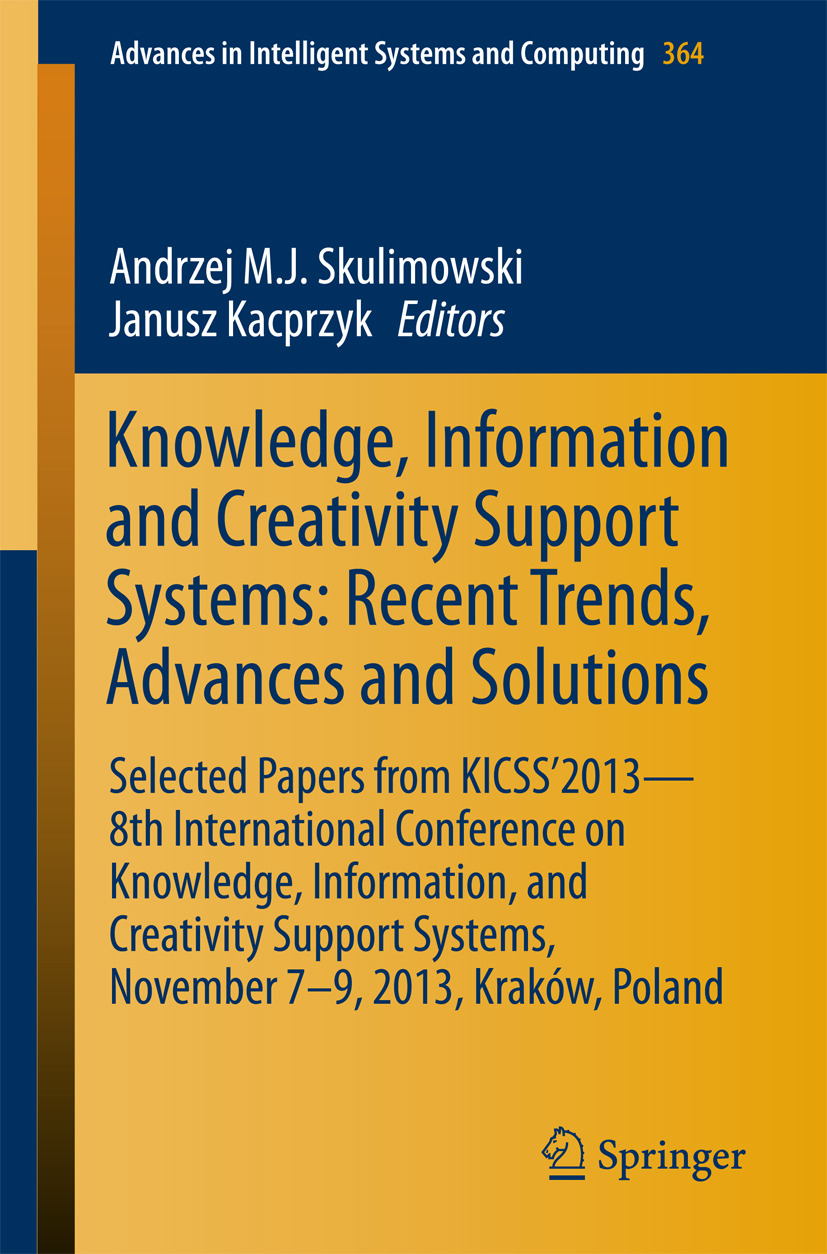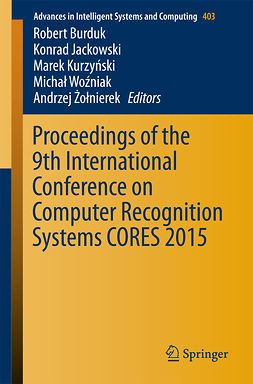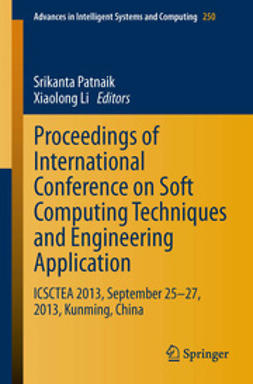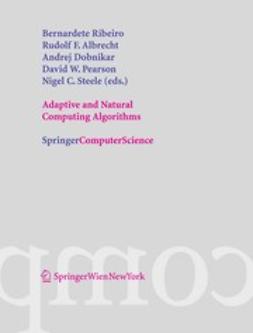Kacprzyk, Janusz
Knowledge, Information and Creativity Support Systems: Recent Trends, Advances and Solutions
1. Preface and Highlights of KICSS’2013—the 8th International Conference on Knowledge, Information and Creativity Support Systems
Andrzej M. J. Skulimowski, Janusz Kacprzyk
Part I. Knowledge
2. Usefulness of Inconsistency in Collaborative Knowledge Authoring in Semantic Wiki
Weronika T. Adrian, Grzegorz J. Nalepa, Antoni Ligęza
3. Modeling and Empirical Investigation on the Microscopic Social Structure and Global Group Pattern
Zhenpeng Li, Xijin Tang
4. Human-Like Knowledge Engineering, Generalization, and Creativity in Artificial Neural Associative Systems
Adrian Horzyk
5. Improvement of a Web Browser Game Through the Knowledge Extracted from Player Behavior
João Alves, José Neves, Sascha Lange, Martin Riedmiller
6. Using Extracted Symptom-Treatment Relation from Texts to Construct Problem-Solving Map
Chaveevan Pechsiri, Onuma Moolwat, Rapepun Piriyakul
Part II. Information
7. An Argument-Dependent Approach to Determining the Weights of IFOWA Operator
Cuiping Wei, Xijin Tang
8. Conceptualizing an User-Centric Approach for Context-Aware Business Applications inthe Future Internet Environment
Emilian Pascalau, Grzegorz J. Nalepa
9. Preprocessing Large Data Sets by the Use ofQuick Sort Algorithm
Marcin Woźniak, Zbigniew Marszałek, Marcin Gabryel, Robert K. Nowicki
10. ST Method-Based Algorithm for the Supply Routes for Multilocation Companies Problem
Lidia Dutkiewicz, Edyta Kucharska, Krzysztof Ra̧czka, Katarzyna Grobler-Dȩbska
11. Information Adaptation by an Intelligent Knowledge-Oriented Mechanism
Wiesław Pietruszkiewicz, Dorota Dżega
12. Eval-net: Elements of Evaluation Nets as Extension to Petri Nets
Michał Niedúwiecki, Krzysztof Rzecki, Krzysztof Cetnarowicz
Part III. Creativity
13. A Japanese Problem-Solving Approach: The KJ Ho Method
Susumu Kunifuji
14. Visual Anonymity in Online Communication: Consequences for Creativity
Thomas Köhler
15. Creativity Effects of Idea-Marathon System (IMS): Torrance Tests of Creative Thinking (TTCT) Figural Tests for College Students
Takeo Higuchi, Takaya Yuizono, Kazunori Miyata, Keizo Sakurai, Takahiro Kawaji
16. A Color Extraction Method from Text for Use in Creating a Book Cover Image that Reflects Reader Impressions
Takuya Iida, Tomoko Kajiyama, Noritomo Ouchi, Isao Echizen
17. On the Role of Computers in Creativity-Support Systems
Bipin Indurkhya
18. Visualization of N-Gram Input Patterns for Evaluating the Level of Divergent Thinking
Taro Tezuka, Shun Yasumasa, Fatemeh Azadi Naghsh
19. Knowcations—Positioning of a Meme and Cloud-Based Personal Second Generation Knowledge Management System
Ulrich Schmitt
20. Comparing Different Implementations of the Same Fitness Criteria in an Evolutionary Algorithm for the Design of Shapes
Andrés Gómez Silva Garza
21. Human Smart Cities: A New Vision for Redesigning Urban Community and Citizen’s Life
Grazia Concilio, Jesse Marsh, Francesco Molinari, Francesca Rizzo
22. The Role of Creativity in the Development of Future Intelligent Decision Technologies
Andrzej M.J. Skulimowski
Part IV. Creative Decisions
23. Solving a Multicriteria Decision Tree Problem Using Interactive Approach
Maciej Nowak
24. Strategic Planning Optimization Using Tabu Search Algorithm
Wojciech Chmiel, Piotr Kadłuczka, Joanna Kwiecień, Bogusław Filipowicz, Przemysław Pukocz
25. Need for Collective Decision When Divergent Thinking Arises in Collaborative Tasks of a Community of Practice
D. Assimakopoulos, M. Tzagarakis, J. Garofalakis
26. Encoding Clinical Recommendations into Fuzzy DSSs: An Application to COPD Guidelines
Aniello Minutolo, Massimo Esposito, Giuseppe Pietro
27. Approximation of Statistical Information with Fuzzy Models for Classification in Medicine
Marco Pota, Massimo Esposito, Giuseppe Pietro
28. Formal Specification of Temporal Constraints in Clinical Practice Guidelines
Marco Iannaccone, Massimo Esposito
Part V. Feature Engineering and Classification
29. A Comparative Study on Single and Dual Space Reduction in Multi-label Classification
Eakasit Pacharawongsakda, Thanaruk Theeramunkong
30. Feature Selection Using Cooperative Game Theory and Relief Algorithm
Shounak Gore, Venu Govindaraju
31. Classification with Rejection: Concepts and Evaluations
Wladyslaw Homenda, Marcin Luckner, Witold Pedrycz
32. Complementarity and Similarity ofComplementary Structures in Spaces ofFeatures and Concepts
Wladyslaw Homenda, Agnieszka Jastrzebska
33. Modeling in Feature and Concept Spaces: Exclusion Relations and Similarities ofFeatures Related with Exclusions
Agnieszka Jastrzebska, Wojciech Lesinski
34.
Petr Homola
35. A Clustering-Based Approach to Reduce Feature Redundancy
Renato Cordeiro Amorim, Boris Mirkin
Part VI. Music and Video
36. Building Internal Scene Representation inCognitive Agents
Marek Jaszuk, Janusz A. Starzyk
37. Optical Music Recognition as the Case of Imbalanced Pattern Recognition: A Study of Single Classifiers
Agnieszka Jastrzebska, Wojciech Lesinski
38. Modeling and Recognition of Video Events with Fuzzy Semantic Petri Nets
Piotr Szwed
39. Self-localization and Navigation in Dynamic Search Hierarchy for Video Retrieval Interface
Tomoko Kajiyama, Shin’ichi Satoh
40. On the Application of Orthogonal Series Density Estimation for Image Classification Based on Feature Description
Piotr Duda, Maciej Jaworski, Lena Pietruczuk, Marcin Korytkowski, Marcin Gabryel, Rafał Scherer
41. Fast Image Search by Trees of Keypoint Descriptors
Patryk Najgebauer, Rafał Scherer
42. Creative Intersections of Computing and Music Composition
Ewa Łukasik
Nyckelord: Computer Science, Artificial Intelligence (incl. Robotics), Computational Intelligence
- Utgivare
- Kacprzyk, Janusz
- Skulimowski, Andrzej M.J.
- Utgivare
- Springer
- Utgivningsår
- 2016
- Språk
- en
- Utgåva
- 1st ed. 2016
- Serie
- Advances in Intelligent Systems and Computing
- Sidantal
- 8 sidor
- Kategori
- Datateknik, Datakommunikation
- Format
- E-bok
- eISBN (PDF)
- 9783319190907
- Tryckt ISBN
- 978-3-319-19089-1











